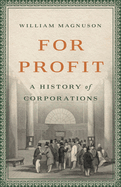
In For Profit: A History of Corporations, law professor William Magnuson (Blockchain Democracy) delivers a comprehensive and lively account of eight corporations that have changed the world. His engaging, episodic history reveals the fundamental characteristics, extraordinary accomplishments and profound weaknesses of some of the world's most powerful institutions, including the Roman Republic, which forged publicly active, privately held institutions to win the Punic Wars; the Medici Bank, which financed Europe and an explosion of culture in medieval Italy; the transcontinental railroad (and the corporations to which Congress entrusted it) that connected the United States after the Civil War; and Facebook, the website that promises to connect everyone.
Magnuson, beginning in antiquity, constructs a compelling definition of the corporation. Although, as commonly understood, corporations are privately held instruments of wealth acquisition, they also live and die based on their ability to solve problems. These problems often exist beyond the capacity of existing institutions and private individuals, and solving them is critical to a society's flourishing--or even survival. But Magnuson is no apologist, nor does he gloss over corporations' structural challenges and their inherent risks of corruption. Particularly as the accounts approach contemporary times, Magnuson picks apart conventional defenses, and the blind worship of, the so-called virtues of such multinational and private equity corporations as Exxon, Kohlberg Kravis Roberts & Co. (KKR) and Facebook/Meta (and the transformations brought about by Silicon Valley as a whole). The result is a valuable, discerning assessment of these enormously influential societal actors--and a clear set of recommendations to make them serve the good. --Walker Minot, freelance writer and editor

